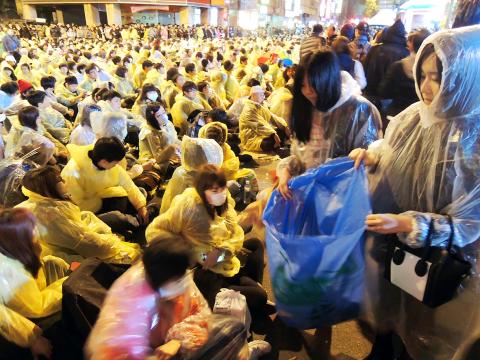Hundreds of students surprised the nation on Tuesday night when they broke off from an overnight sit-in and occupied the legislature in protest against the Chinese Nationalist Party (KMT) caucus’ handling of the cross-strait service trade pact.
After successfully fending off several evacuation attempts by the police and garnering national support over the past five days, the protest, which the media have dubbed the “Sunflower movement” — the largest student movement since the Wild Lily movement in 1990 that propelled legislative reform.
There are skeptics questioning almost everything about the group of young people — from their storming of the legislative compound and drinking beer in the legislative chamber, to their connections with opposition parties and their knowledge about the trade pact.

Photo: Hsieh Wen-hua, Taipei Times
In particular, there have been many questions about the cause and sustainability of the movement.
The students have been responding to these queries on an hourly basis.
In the legislature and the rallies outside the Legislative Yuan compound, students organized into groups to clean graffiti from the walls, recycle trash and maintain order.
Set up like a well-trained army unit, the students were divided into various teams of logistics, communication, patrol and — with help from volunteer physicians and lawyers — a medical team and a legal team were quickly assembled.
That was partly because the leaders of the movement, National Taiwan University graduate student Lin Fei-fan (林飛帆) and National Tsing Hua University student Chen Wei-ting (陳為廷), as well as other members of the core leadership are seasoned veterans in social movements despite their youth.
They gained experience from numerous protests in the past two years, including the one against land seizures at Miaoli County’s Dapu Borough (大埔) and the construction of the Miramar resort in Taitung County, the campaign against media monopolization and the anti-nuclear movement.
Well aware of the nation’s political situation, the students have distanced themselves from political parties and stayed away from the so-called “blue-green struggle.”
Quite contrary to what several local media outlets and the KMT portray, most of the students in those protests have been able to explain their cause clearly and stand firmly for what they believed in.
The “Sunflower movement” is more than an overnight phenomenon and should be interpreted beyond these young people’s discontent with President Ma Ying-jeou’s (馬英九) governance.
It is the cultivation of the students’ effort in the past two years, during which they defied conventional views about the younger generation — that they could not care less about politics and the world they live in — and showed Taiwanese that they do care and they would take action to make the country a better place — any time and anywhere.
If today’s group of young activists have learned from what happened to the “Wild Lily generation,” some of them are more than likely to become the backbone of Taiwanese politics and social movements in the next 10 years.
From what people have seen so far, the new young activists show a deep caring for the nation and for the purity of politics as it was in the early 1990s.

Chinese spouse and influencer Guan Guan’s (關關) residency permit has been revoked for repeatedly posting pro-China videos that threaten national security, the National Immigration Agency confirmed today. Guan Guan has said many controversial statements in her videos posted to Douyin (抖音), including “the red flag will soon be painted all over Taiwan” and “Taiwan is an inseparable part of China,” and expressing hope for expedited reunification. The agency last year received multiple reports alleging that Guan Guan had advocated for armed reunification. After verifying the reports, the agency last month issued a notice requiring her to appear and explain her actions. Guan

GIVE AND TAKE: Blood demand continues to rise each year, while fewer young donors are available due to the nation’s falling birthrate, a doctor said Blood donors can redeem points earned from donations to obtain limited edition Formosan black bear travel mugs, the Kaohsiung Blood Center said yesterday, as it announced a goal of stocking 20,000 units of blood prior to the Lunar New Year. The last month of the lunar year is National Blood Donation Month, when local centers seek to stockpile blood for use during the Lunar New Year holiday. The blood demand in southern Taiwan — including Tainan and Kaohsiung, as well as Chiayi, Pingtung, Penghu and Taitung counties — is about 2,000 units per day, the center said. The donation campaign aims to boost

The Kaohsiung Tourism Bureau audited six hotels in an effort to prevent price gouging ahead of Korean band BTS’ concert tour in the city scheduled for Nov. 19, 21 and 22 this year. The bureau on Friday said that the audits — conducted in response to allegations of unfair pricing posted on social media — found no wrongdoing. These establishments included the local branches of Chateau de Chine, Hotel Nikko, My Humble House, and Grand Hai Lai, it said, adding that the Consumer Protection Commission would have penalized price gougers had the accusations been substantiated. The bureau said the Tourism Development Act

The Central Weather Administration (CWA) said a magnitude 4.9 earthquake that struck off the coast of eastern Taiwan yesterday was an independent event and part of a stress-adjustment process. The earthquake occurred at 4:47pm, with its epicenter at sea about 45.4km south of Yilan County Hall at a depth of 5.9km, the CWA said. The quake's intensity, which gauges the actual effects of a temblor, was highest in several townships in Yilan and neighboring Hualien County, where it measured 4 on Taiwan's seven-tier intensity scale, the CWA said. Lin Po-yu (林柏佑), a division chief at the CWA's Seismological Center, told a news conference